When he rode down a gold escalator with a supermodel at his side, nobody took him seriously. After a verbal spat with Megyn Kelly at the first GOP debate, nobody took him seriously. And midway through the primaries — still, nobody took him seriously.
But Donald J. Trump, the spray tanned New York real-estate magnate with a billion dollar business portfolio, outlasted them all — even the “inevitable” first female president, Hillary Rodham Clinton.
Instead, we got the first president-elect to have a female campaign manager. It was a historic win, and the man is already delivering on his promise to shake things up. Never before has someone been elected to the White House who has never even run for an elected office, so we’re about to see if the first time yields public profits.
Love him or hate him, here are five reasons that Trump’s win will go down as one of the most-talked about events in in American history:
He is the oldest president ever elected

AP Photo/Gerry Broome
Although he displayed an inordinate amount of energy and bluster on the campaign trail, Trump is still 70 years old — a year older than the previous president who held that honor, Ronald Reagan (69).
To put that into perspective, the age of both men is greater at the time of their election than those presidents who have died in office of natural causes: Zachary Taylor (65), William Henry Harrison (68), Warren G. Harding (57), And Franklin Delano Roosevelt (63).
If Trump were elected to a second term, he wold leave office when he’s nearly 80 years old.
His business portfolio includes hundreds of companies all across the world

AP Photo/Michael Probst, File
Trump’s business portfolio, which Forbes estimates is worth $3.7 billion, is unprecedented for a U.S. president. The only candidate to run who even comes close is Ross Perot, a fellow billionaire and third-party candidate who captured 19 percent of the vote in 1992 after promising to end the outsourcing of American jobs.
Because Trump was not a man for sale in this election, he beat his challengers handily. They had accumulated debts to Washington special interests that voters had grown weary of, and instead elected an outspoken pariah of Washington budget cuts and bans on lobbying.
Critics fear if he Trump does not relinquish control of his private holdings, it will be hard for him as president to act in the private good.
He’s the only president-elect that refused to release his taxes
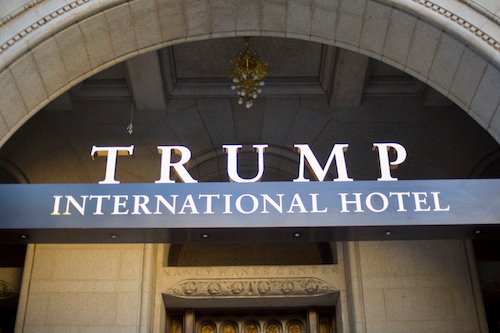
AP Photo/Pablo Martinez Monsivais
Since it became tradition in the 1970s, every candidate to run for the nation’s highest offie has released their tax returns with the exception of Trump. Many are unlikely to forget the pledge that when his “routine audit” winds down, his taxes will become public.
But with his election to the presidency those IRS audits are likely to continue. And, speaking of taxes, Trump intends to simplify the code while cutting $25 trillion in government spending.
His children are primed to be major players in Washington
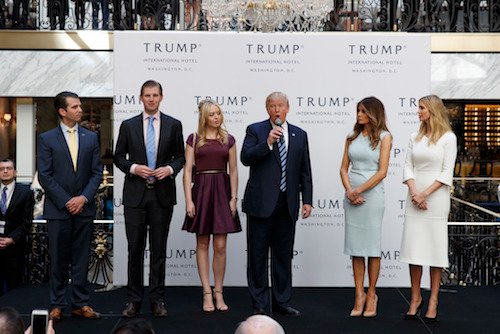
AP Photo/ Evan Vucci
It’s not unprecedented for a president to bring on his children in an important role: John Adams appointed John Quincy Adams to be his secretary in Europe, Theodore Roosevelt dispatched his daughter Alice to Asia on an important diplomatic trip, and George H.W. Bush threw his weight behind his son’s political ambition to help keep the White House in the family.
But deep involvement of Ivanka Trump and her husband Jared Kushner — who are reportedly considering a move to Washington even ahead of first lady Melania — have critics warning of a future nation being run like second-rate “banana republic.” Sons Eric and Donald Jr., both executives at the Trump Organization, could also potentially get top secret clearance.
He decimated the polling business
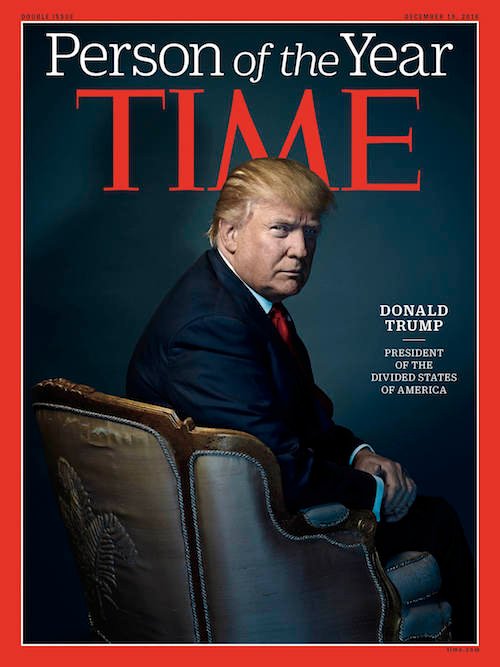
Nadav Kander for Time Magazine via AP
In an era of Big Data (and little data), pollsters such as Nate Silver were blatantly wrong in their election forecasting. While Trump earned the nod from working-class whites and outperformed in many other demographics. In the region of the Rust Belt, this was especially true.
In Wisconsin, for example, pollsters had Clinton up by 8 points; that’s a state Trump can count in his column. With non-educated voters he beat model predictions by 3 points. And with college graduates Clinton was predicted to win big league — she didn’t. Trump actually won with college-educated whites of both genders, and in areas he was supposed to do well in, he did really well.
In short Trump’s historic win forces the polling business to re-examine itself, and follow-ups on reports of undercounts must also be investigated.
He won the White House, but lost the popular vote by a record margin
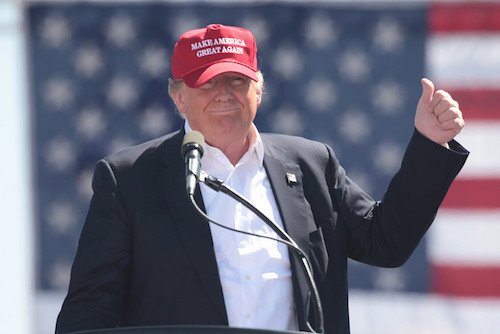
Flickr/Gage Skidmore
As the final tally is totaled and the picture of Election Day becomes clearer, you can count this among Trump’s historical records: He won the presidency, but lost the popular vote by 2.8 million voters.
That’s about five times the number of the next president who won the presidency in spite of losing the popular vote: George W. Bush. In total, five men own the dubious honor of having been elected president with fewer votes than his opponent: John Quincy Adams (1824), Rutherford Hayes (1876), Benjamin Harrison (1888), Bush (2000), and Trump (2016).
He’s the only president to have never served in government
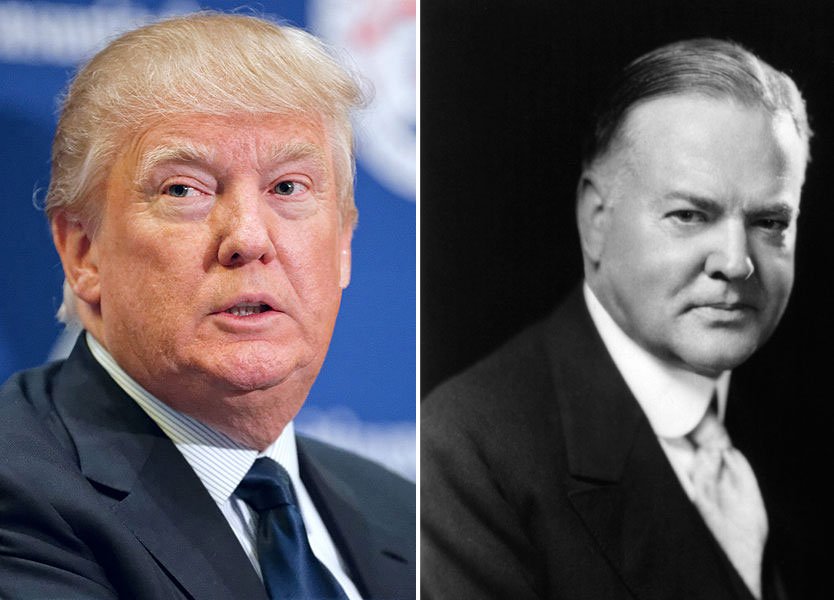
Businessman Donald Trump side by side with Secretary of Commerce Herbert Hoover. (Wikimedia Commons)
While Trump made his billions by reshaping city skylines, many other men made their claim to fame through military endeavors and public servitude. None of them will hold the title of “45th President of the United States,” however — that is Trump’s and his alone.
While this makes him a historic figure, he does join five other men in the presidential lineage who had never held elective office: former Secretary of War (and later, Chief Justice) William Taft; former war heroes Zachary Taylor, Ulysses S. Grant, and Dwight D. Eisenhower; former Secretary of Commerce Herbert Hoover.
Although his World War II heroics led Eisenhower to become popular among Americans, the others were divisive presidents elected during times of national crises.
